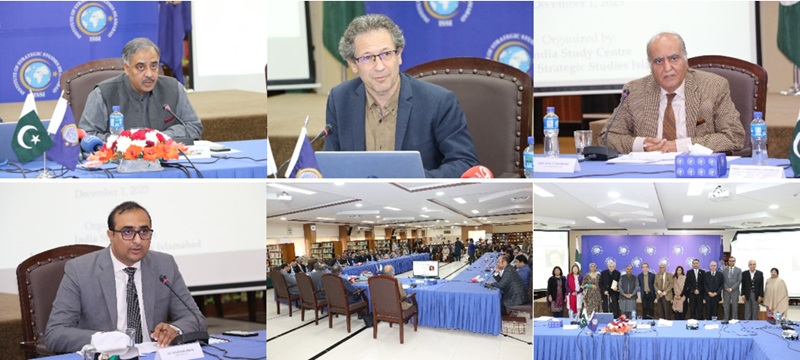
“The Plight of Indian Minorities under Modi’s India”
Islamabad : The India Study Centre (ISC) at the Institute of Strategic Studies Islamabad (ISSI) hosted renowned French scholar Christophe Jaffrelot, for a roundtable discussion on “The Plight of Indian Minorities under Modi’s India.” The event was attended by academics, practitioners, diplomats, students and representatives of the media.
Professor Jaffrelot affirmed that it was necessary to mention vigilantism and hate speeches; and that there was a lot more to cover when Muslims’ marginalization in today’s India was contemplated. In this context, three facets — namely institutional representation, socio-economic condition, and educational status — of Indian Muslims were worth examining. Through thoroughly researched quantitative data, Prof. Jaffrelot pointed out as to how Muslims in India were facing a consistent decline in their condition since 1947. Besides Muslims’ significant proportion in India’s overall population, they were highly underrepresented in government offices, but over-represented in jails. He asserted that the most deplorable reality about Muslims under the BJP was that their representation in elected assemblies, either in the Lok Sabha or State Assemblies, was severely decreasing. From the 1980s to 2019, Muslims participation in the Lok Sabha had decreased from 9 percent to just 4.6 percent. In major Indian states like UP, Muslims had been facing political marginalization.
Prof. Jaffrelot also highlighted the yawning socio-economic gaps between Muslims and Hindus. Muslims in India were more deprived institutionally than other backward communities like Scheduled Castes (SCs), Scheduled Tribes (STs) and Other Backward Classes (OBCs). Muslims’ share of wealth was just 9.5 percent compared to 36.1 percent of Hindu Upper castes and 33.3 percent of Hindu OBCs. Same was the case with education. There was a huge decline in Muslims going for higher education, and this gap had increased under the BJP government. In 2021-22, only 19.8 percent of the whole Muslim population entered higher education institutions. These factors had collectively caused Muslims’ deprivation under Modi’s India.
During the interactive session, experts delved into the deepening marginalization of Muslims in socio-economic sectors, institutions, and education. Prof. Jaffrelot further illustrated the wealth gap, job losses, decreasing educational opportunities, and the threat to Urdu language in India. The discussion also touched upon the challenges faced by other minority communities, including Christians, and the role of the diaspora in spreading the ‘Hindutva’ ideology globally. The ongoing de-Kashmirization process, developments in South India, and the issue of Akhand Bharat were also discussed. The exchanges also covered the future trajectory of India, the potential for radicalization of Indian minorities due to their marginalization, and the geopolitical implications of the rise of the BJP-led ‘Hindutva’ ideology. Prof. Jaffrelot emphasized the importance of understanding the ground realities and the long-term impact of policies pursued by the incumbent Indian government.
Dr. Khurram Abbas, Director ISC, in his introductory remarks said that the BJP’s attempt to unite all Hindu fragments together into a single Hindu party will fail as sub-castes galore had begun to create small parties of their own in every state. Hindus alone had 1,600 jatis, with multiple caste-like divisions and holding them together for a long time was highly challenging. According to the Election Commission of India, 38 new parties registered after 2014, the year when Mr. Modi was sworn in as Prime Minister. To keep these parties united, the BJP required ‘enemy’ within and outside of India.
DG ISSI Ambassador Sohail Mahmood welcomed the distinguished participants and emphasized the significance of the subject. He underlined that contemporary India was drifting towards deeper polarization, more religious intolerance, and increased violence. Rise in hate speech, mushrooming of vigilante groups, frequent mob lynchings, demolition of churches and mosques, schemes like ‘Love Jihad’ and ‘Ghar Wapsi’, and legislative measures like the National Register of Citizens and Citizens Amendment Act (CAA) were manifestations of the ‘Hindutva’ ideology, which had a deep impact on the minorities, especially Muslims. He further pointed out the disturbing demographic change being effected in the Indian Illegally Occupied Jammu and Kashmir (IIOJK) by turning the local Muslim majority into a minority in its own land through the colonial settler project. India under the BJP was also witnessing unprecedented rise in Islamophobia. The DG ISSI pointed out that Prof.Dr. Jafferlot, a leading international scholar on South Asia and India, had meticulously mapped India’s transformation and shown how Muslims faced increased social marginalization, institutional exclusion and judicial obliteration.
The Roundtable ended with concluding remarks by Ambassador Khalid Mahmood, Chairman BoG ISSI.